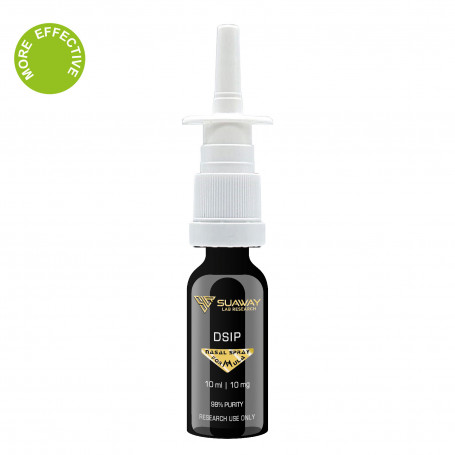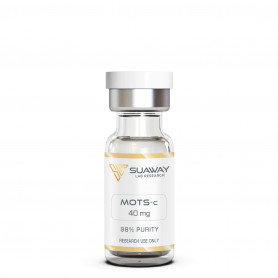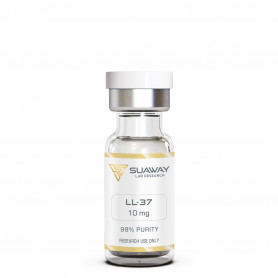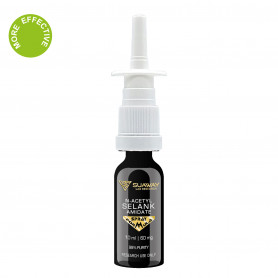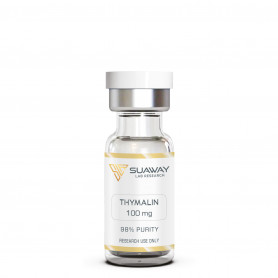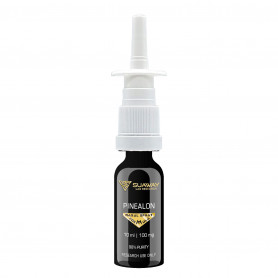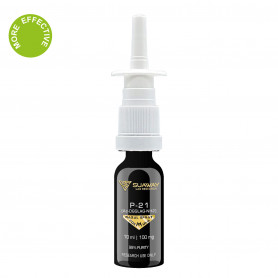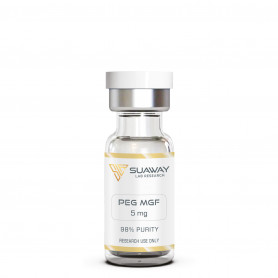DSIP - 10ml/10mg
DSIP is a neuropeptide that affects many endocrine and physiological functions. It has been demonstrated to have the effects that are listed below:
- Promotes sleep
- Improves sleep in chronic insomnia
- Limit stress
- Normalize blood pressure
- Alter pain perception.
Total Spray: 82 (122 mcg per spray)
FRESHLY PREPARED SOLUTION
Beschreibung
STRUCTURE
Sequence: Trp-Ala-Gly-Gly-Asp-Ala-Ser-Gly-Glu
Molecular Formula: C35H48N10O15
Molecular Weight: 848.824 g/mol
CAS Number: 62568-57-4
Peptide purity: greater than 98%
Other details: No TFA Salt, No Mannitol
Storage: This product must be stored at 4°C. No suitable for freezing.
DESCRITPION
In 1977, researchers first extracted the naturally occurring compound known as delta sleep-inducing peptide (DSIP) from bunny brain. As its title suggests, DSIP encourages sleep, and this effect has been seen not only in humans but also in bunnies, mice, rats, cats, and other animals.
In point of fact, DSIP encourages a certain form of sleep that is distinguished by an increase in the delta rhythm of the electroencephalogram (EEG). DSIP is typically found in the blood, although only in very trace concentrations. There is a significant daily change in both brain and plasma DSIP concentrations, and there is a link among DSIP plasma concentrations and circadian rhythm in humans.
Mornings tend to have lower concentrations, whereas afternoons tend to have greater concentrations. An increase in the concentration of endogenous DSIP has been demonstrated to be related with a suppression of both slow-wave sleep and rapid-eye movement sleep, as well as, curiously enough, an increase in body temperature. The beginning of sleep has an effect on the plasma concentrations of the DSIP protein.
Patients who have Cushing's syndrome often report not getting enough slow-wave sleep, yet the diurnal fluctuation in slow-wave and rapid-eye-movement sleep in these people seems to be comparable to what is seen in normal patients.
DSIP is an uncommon peptide because, in contrast to the vast majority of other peptides, it is able to pass unhindered across the blood-brain barrier and is rapidly absorbed from the gastrointestinal tract without being denatured by enzymes. At human milk, DSIP may be found in amounts that are considered to be very high. The power of a feed to put a baby to sleep is something that can be attested to by every mother who has breastfed her children.
Since the discovery of DSIP, a number of research have been carried out to investigate the possibility that DSIP is the primary endogenous sleep factor. In human patients that were injected with tiny amounts, it was shown to enhance the 'pressure to sleep,' and this, along with its capacity to produce delta-wave sleep, led to its evaluation as a potential therapy for insomnia.
Instead of being classified as a sedative, DSIP has been referred to as a peptide that induces sleep. There is a modulating influence on sleep and wake functions, with higher activity occurring under conditions that disrupt sleep. When it comes to healthy participants who are not experiencing any kind of sleep disorder, there are hardly any impacts.
Because DSIP is not a nighttime sedative, it does not have to be used just before bedtime. A single dosage of DSIP administered over the course of the day will result in enhanced sleep quality beginning the next evening and continuing for many nights after that.
In a surprising turn of events, DSIP has been shown to be beneficial in the treatment of narcolepsy. It is conceivable that it does this by resetting circadian rhythms in the body. When single and repeated injections of DSIP were administered in a controlled double-blind research, disrupted sleep was regulated, and greater performance and enhanced alertness were demonstrated during awake cycles. Stress tolerance and coping behaviour were also improved as a result of the treatment.
A preliminary clinical research involving a limited number of human participants indicated that DSIP greatly improved mood and reduced pain perception. According to the findings of the same research, DSIP may be beneficial for patients who have a physiologic reliance on other pain drugs since it helps to minimise withdrawal symptoms and the pain rebound that often happens after the termination of long-term analgesic treatment.
In cases of chronic pain, maintaining adequate analgesic management might be challenging. Although current treatments, such as non-steroidal anti-inflammatory drugs (NSAIDs) and opiates, are helpful in the short term, there is a risk of dangerous side effects if they are taken for an extended period of time. Because conventional analgesics are most effective when used for the temporary relief of pain, researchers have been looking for an alternate approach to treating pain syndromes that are persistent.
According to studies conducted on rats, the analgesic effects of DSIP are produced via its interaction with central opioid receptors. A strong pain-relieving effect that is dosage dependent is produced by the peptide, however it is unclear whether these are direct or indirect effects. Despite the fact that DSIP and opiate drugs interact on the same receptors in the central nervous system, there is no evidence to suggest that DSIP causes the same kind of reliance as opiate medications do.
Because DSIP is able to keep oxidative phosphorylation going even when it is in the presence of hypoxia, the peptide has the potential to be an effective therapy for illnesses such as stroke and heart attack. It is possible that DSIP, by its ability to maintain normal mitochondrial activity, might aid to mitigate the metabolic damage brought on by a lack of oxygen and preserve tissue while waiting for appropriate blood flow to be restored.
Because of these qualities, DSIP has the potential to be a very effective antioxidant that also operates at the most fundamental level of free radical generation. The formation of free radicals is cut down by DSIP thanks to the way it maintains proper mitochondrial activity.
After discovering that DSIP had the ability to change mitochondrial activity in low-oxygen environments, researchers began looking into the mechanism through which the peptide exerts this impact. It has come to our attention that DSIP inhibits fluctuations in the levels of monoamine oxidase type A (MAO-A) and serotonin. Because of this discovery, the researchers naturally began to hypothesise that the peptide may have a role in the development of the depressive disorder.
An examination of the CSF fluid taken from individuals suffering from significant depression indicated lower levels of the protein DSIP when compared to levels found in controls. It should not come as a surprise, given the strong connection that exists between sleep and depression, that a peptide that is involved in the regulation of sleep cycle might also have a role in the development of depression. To this day, there has been no effort made to treat depression by bringing DSIP levels back into the normal range.
REFERENCES
F. Bes et al., "Effects of delta sleep-inducing peptide on sleep of chronic insomniac patients. A double-blind study" [PubMed]
E.M. Khvatova et al. "Effects of delta-sleep inducing peptide (DSIP) and some analogues on the activity of monoamine oxidase type A in rat brain under hypoxia stress" [PubMed]
A. Nakamura et al., "Potent antinociceptive effect of centrally administered delta-sleep-inducing peptide (DSIP)" [PubMed]
D. Schneider-Helmert et al., "Acute and delayed effects of DSIP (delta sleep-inducing peptide) on human sleep behavior" [PubMed]
D. Schneider-Helmert & G.A. Schoenenberger "The influence of synthetic DSIP (delta-sleep-inducing-peptide) on disturbed human sleep" [SpringerNature]
D. Schneider-Helmert "Effects of delta-sleep-inducing peptide on 24-hour sleep-wake behaviour in severe chronic insomnia" [PubMed]
B.J. Pollard et al., "Delta sleep-inducing peptide" [European Journal of Anaesthesiology]
A. Westrin et al., "High delta sleep-inducing peptide-like immunoreactivity in plasma in suicidal patients with major depressive disorder" [PubMed]
H. Walleus et al., "Decreased concentrations of delta-sleep inducing peptide in plasma and cerebrospinal fluid from depressed patients" [Nordisk Psykiatrisk Tidsskrift]
E.M. Khvatova et al., "Delta sleep inducing peptide (DSIP): effect on respiration activity in rat brain mitochondria and stress protective potency under experimental hypoxia" [PubMed]
W. Larbig et al., "Therapeutic effects of delta-sleep-inducing peptide (DSIP) in patients with chronic, pronounced pain episodes. A clinical pilot study" [PubMed]
A. Bjartell et al., "Delta sleep-inducing peptide (DSIP): An overview of central actions and possible relationship to psychiatric illnesses" [Nordisk Psykiatrisk Tidsskrift]
DISCLAIMER
This product is intendend for lab research and development use only. These studies are performed outside of the body. This product is not medicines or drugs and has not been approved by the FDA or EMA to prevent, treat or cure any medical condition, ailment or disease. Bodily introduction of any kind into humans or animals is strictly forbidden by law. This product should only be handled by licensed, qualified professionals.
All product information provided on this website is for informational and educational purposes only.

